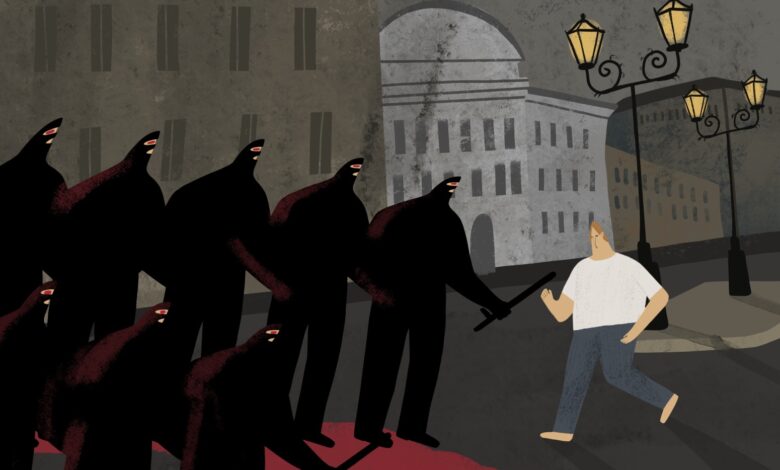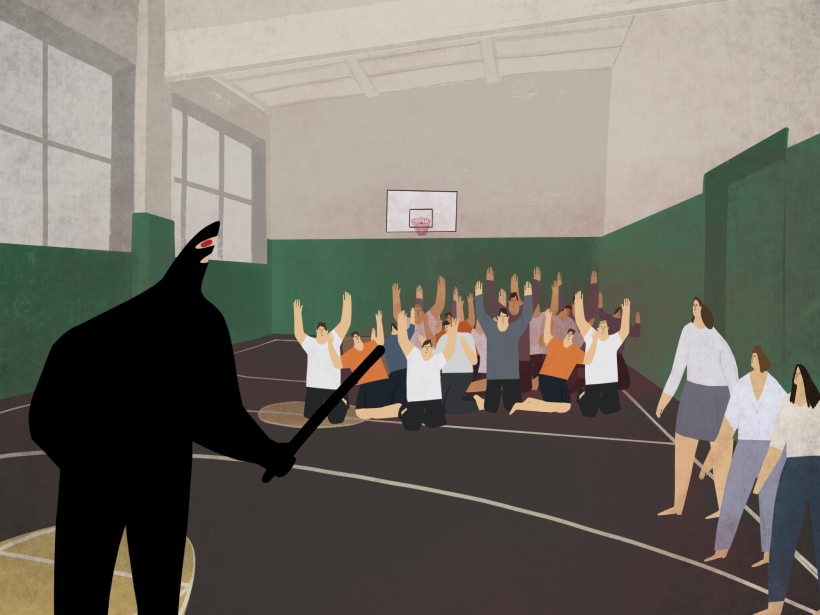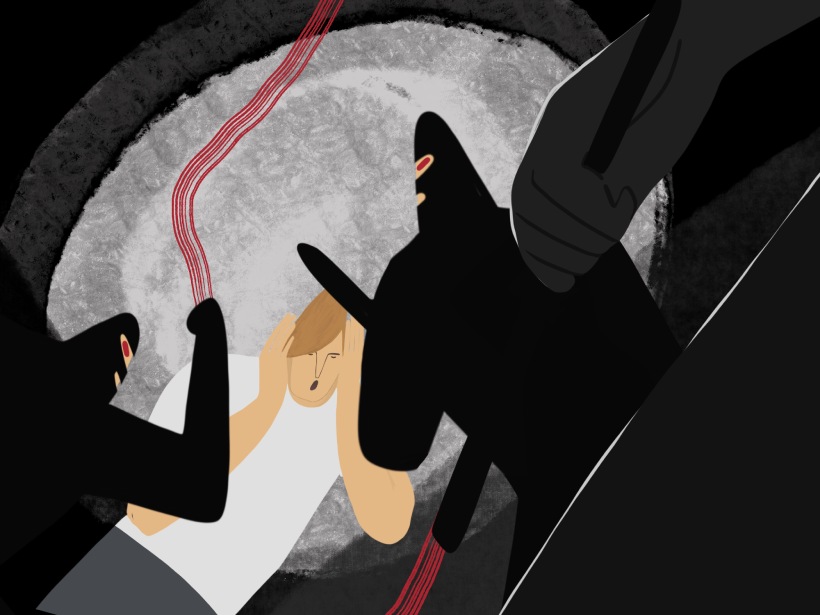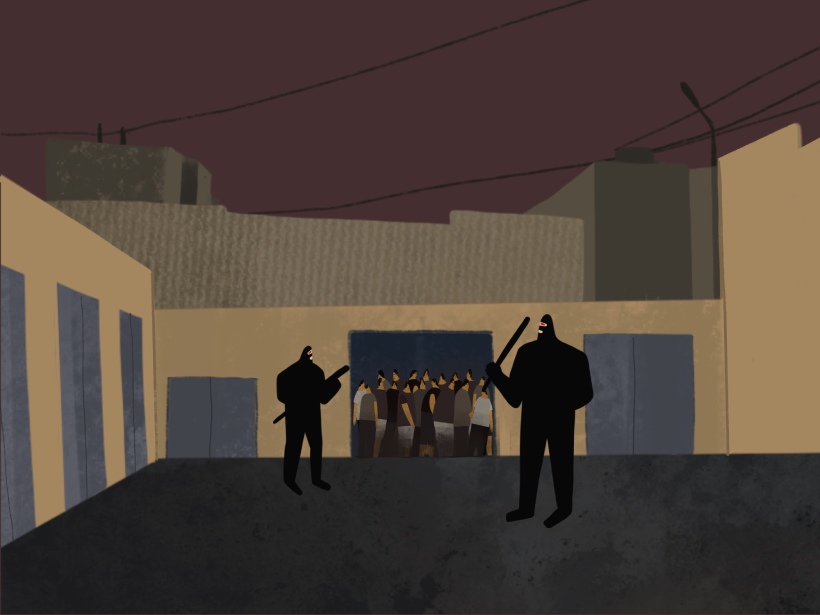Torture and violence in 2020 – Mikita’s story

22 years old, student. “The garage gate was closed, and the only thing that could be heard from behind it was the sound of automatic rifles being reloaded”
Mikita (name changed at the interviewee’s request) is a young man who has never been interested in politics before. He now recalls the events of August 2020 with humor and speaks calmly about them and the violence he was a victim of. His story once again makes us ask all the same questions: “Where do security forces get so much cruelty from?” and “Why do they do this?” Most likely, they don’t know the answers either. One thing is clear: while the big political game was unfolding, these people lost the most important battle of their lives – the battle for the right to be called a human. Because remaining a human in any situation is true heroism.
“People were squashed into prisoner transporters”

Mikita recalls what Brest was like in the first days after the 2020 presidential election. People were outraged by the rigged election results, “Changes!” [a song by the Soviet rock band Kino, written by its frontman Viktor Tsoi and frequently used during the 2020 post-election protests] was blaring from cars everywhere, and there was a sense that there would be protests in the air.
“I didn’t care about politics before 2020. But huge lines of people wanting to sign for their candidate, people’s active participation I had never seen before, could not help but inspire! People’s longing for something better in their lives forced them to take to the streets. Myself included.”
Mikita and his friend were walking in the city streets and saw security forces moving toward downtown. At first, they checked passersby’s belongings and started dispersing the crowd later on. Some of them stayed on Savetskaya Street, and the others blocked the avenue. The security forces started pushing people back. Some of the people tried to build barricades on the roads but were dispersed.
“We ended up on Savetskaya Street at 1 am. My cell phone was dead, so I called my sister from a friend’s phone. She was about to drive home from her friends who lived downtown. The agreement was that I would come over there, and we would leave together. My sister and her husband passed by the riot police, they were quietly let through, and I figured I wouldn’t have a problem either. I didn’t want to keep my family waiting, so I jogged toward them.”
There was not a soul on the street, only a riot police chain at the end of Savetskaya Street. Mikita stopped and asked if he could squeeze through there to get home. The security forces pointed to the side of their chain: “Quick! And stay out of the way.”
“I approached, but the security forces still blocked my path with their shields. I didn’t understand what was going on and looked around in confusion. And then the shields went down, and two men ran out, twisted my hands, and led me through the ‘corridor’ between the law enforcers. I pretended I was scared and didn’t understand anything. I stood with my head down. One of the riot policemen, a decent man, warned me: ‘Put your hands up and cover your head.’ I obeyed, and so they dragged me, shoving and pushing, to the nearest police station.”
There were other detainees at the police station. Mikita believes he got off lightly because many people were beaten: a man next to him had a bandaged arm. It turned out that a single truncheon blow cut his arm to the bone when he was in a prisoner transporter. He told Mikita that the truncheon was unusual – “something like metal”. The doctors were there, bandaging wounds and bringing those who had lost consciousness back to their senses.
“They were pushing one guy into a cell, but he couldn’t move. He was screaming that his ribs were broken. He screamed and screamed and passed out. They took him out, and we never saw him again”
“That’s where I was trying to find out what was going on. One detainee was sure that we would all be released after the next shift arrived. He was detained on August 9 and released in the morning. I had my phone in my shorts pocket and decided to put it into one guy’s backpack, he was with us there. He turned 18 only a week ago, so I thought he would be released sooner. The law enforcers intended to do so at first as they thought he was still a minor. But they checked his age and kicked the guy inside the cell.”
The detainees spent 1.5 hours in the cell. Later, prisoner transporter vehicles started coming to the police station. The security forces started taking people out in batches and stuffing them into the prisoner transporters. Mikita says that “people were squashed like sardines” – as many people as a vehicle could fit. Before that, everyone had to go through the now-familiar “corridor” of truncheons. When the prisoner transporter started driving, one of the detainees asked the guards where they were heading. The guards replied that they didn’t know because they weren’t local residents. This episode confirmed Mikita’s theory that security forces were brought in from different regions of the country.
I stood with my head down. One of the riot policemen, a decent man, warned me: “Put your hands up and cover your head.” I obeyed

“I know the city well, so I got an idea about where we were going. They took us to the military base where I had once participated in a gala performance while serving on the honor guard detail. They struck us with truncheons as we got off the prisoner transporter, but this time it was just one blow. They led us into a gym. Those who resisted and talked to the law enforcers got hit more, and those who were quiet – only a couple of times. I belonged to the latter category.
We were planted on our bums, legs bent at the knees and put forward; hands had to be behind one’s head and elbows on the knees. The distance between us was about 10 centimeters. The security officers walked around and checked everything and everyone. We were not allowed to change our positions: one would get another blow for an attempt to find a more comfortable position. They would beat us just like that, without reason, ‘as a preventive measure’, so to speak.”
The lights in the hall were always on, and the riot policemen banged their shields with truncheons so that the detainees had no chance to rest or sleep. People fainted from fatigue and beatings in the cramped room. The security forces called paramedics and brought people to their senses on the spot. If they failed to do so, doctors would take the detainees away and not bring them back.
“They only gave people a two-liter bottle of water three times in 24 hours”
The law enforcers only let minors go, and their parents came to pick them up. According to Mikita, the minors were beaten the whole time before they were released – “while they were being taken along various corridors, no one cared how old they were”. There weren’t many women, about six of them. They sat in the gym corner and were told to keep silent. They cried, screamed, and begged for help. No one responded to their pleas. At first, the law enforcers didn’t touch the women, but if the latter asked for something, they would hit them – “don’t get too bold”. Those who had children were allowed to call their families.
“One man clad in black spoke negatively about us. He talked about the security forces being injured and people throwing stones at them. He said that we are all beasts and brutes. He also stated that we need to be gassed.”
They allowed one person at a time to go to the bathroom. The detainees had to walk there in the same twisted position while being prodded with truncheons from behind. The bathroom stall door had to be open at all times, and it didn’t matter if a woman or a man was inside. It was the only opportunity for the men to stand up, so some of them asked to go to the bathroom a few times.
“They only gave people a two-liter bottle of water three times in 24 hours. It wasn’t enough for everyone. I tried to quietly ask riot policemen that passed by what was going on and how long we were to stay there. One of them softly replied that he didn’t know, and the other shouted, ‘Shut the f*ck up’ such that the whole gym heard.
One day passed, and closer to the evening of August 11, they started taking us away one by one to take photos and collect personal information. When they did a head count, there turned out to be 340 people in the gym.
The security officers weren’t from the same law enforcement agencies. At first, the ‘astronauts’ [riot police in tactical gear] were guarding us, then camouflaged military, and later people in black clothes without insignia. I learned from the guys sitting next to me that some of them had been transferred here from some garage. One man started feeling ill there. He turned blue and lay breathless. The garage gate was closed, and the only sound we could hear was that of automatic rifles being reloaded. That was terrifying.”
One man clad in black spoke negatively about us. He talked about how the security forces got injured and said that we were all beasts and brutes
“A policeman made us squat, and when he left, a man in a black uniform guarded us. He allowed us to change our positions but asked us to sit ‘properly’ if the policeman were to return. We didn’t manage to sit down ‘properly’ in time once. The policeman started yelling, and the security forces officer intervened, ‘Lay off them!'”
People in plain clothes wearing masks came to the gym. They were selecting people and taking them away. They didn’t say where or why. Mikita assumes those were KGB officers. The security forces were checking all the detainees’ phones. They found people who had phones with Russian SIM cards, took these people away, and beat information out of them.
“One man was not escorted to the bathroom in time and soiled himself. Only after this was he allowed to get up and have a wash. The law enforcers found a man in possession of mushrooms. We all thought that the man was done for. The law enforcers took him outside the gym and talked to him there. Later, when we were transferred to another place, I saw this man again. He told me he was leaving a store after grocery shopping. Among the produce he purchased were champignon mushrooms. The security forces detained the man and brought him to the gym with all the groceries. When they found out what kind of mushrooms those were, they brought the man inside again and left him in the gym.
Once a law enforcer wearing a red beret entered the gym and told his men that he wasn’t afraid of our glances. He shouted for everyone to raise their heads. It was such a relief! That’s what everyone dreamed of. He said: ‘I understand that there are people who ended up here by accident, but my relatives weren’t out on the streets that day. As they say, you can’t make an omelet without breaking eggs!’ At this, he turned away and left. He looked somewhat like the head of this military base.”
“The detention center staff were on our side”

Then, the detainees were divided into groups and put into a prisoner transporter. Mikita was brought to the detention center near the Central Department Store. All the detainees were led through the usual “corridor” of truncheons and placed in an eight-person basement cell. The law enforcers managed to fit 24 people into it.
“We were glad as we were finally able to straighten up. The detention center staff were on our side. They were outraged about what was going on and called it lawlessness. They advised us to submit complaints against law enforcement officers. They helped us in every way they could and brought cigarettes and water. We didn’t know what would happen to us next. We were sure that they could easily label us traitors to the Motherland.
We tried to entertain ourselves in the cell. I learned to play the Thousand [a card game] with matches. When one detainee received a package from home with sheets of paper, we played the Battleships game [a strategy-type guessing game]. Among us were a businessman from Poland and a former riot policeman, who told us what kind of drills they used to have. All were decent people of different ages. We spent 24 hours in that cell.
The cell door opened, and seven people were summoned for trial around 4 am on August 13. I flew out the door right away, put my shoes on, and got dressed in the hallway. They took us to a prisoner transporter, put us inside, but didn’t beat us anymore. They said we would have to come back later for our belongings.”
The security forces took the detainees to some truck garage and told them to stand in rows instead of taking them to trial as promised. The detainees were given a lecture about how bad the things they did were.
“They said that people had been paid [to go out to protest], that some people in the front lines [of protest columns] were throwing stones and then running away, but they caught us instead. ‘Yes, the president has overstayed his welcome, but this is not a solution,’ said a man in his forties. He said they had pictures of all the protesters and offered: ‘Admit that you were in the front lines of protests, and I give you my word that nothing will happen to you. To whoever doesn’t confess – there are a lot of garages here, and I will turn away.’ A couple of people said what they wanted us to say: they were escorted out, and we didn’t see them again.
I got hit in the chest by a stun grenade on Masherau Street and did not approach the head of the protest column after that. I thought if I counted as someone ‘in the front lines of protests’. I made the right call by not volunteering this information. We had stood in that garage for six hours. The lines were periodically swapped to keep us warm. The nights were already cold, so the security forces closed the garage gate. Someone was even allowed to smoke.
Around 10 am, they led us out to sign the detention reports and took us to the court in prisoner transporters. When they put us in a prisoner transporter, the policeman who had lectured us showed up again and said: ‘I behaved humanely with you, even though I had a different order. I am an ordinary policeman who works in the city. If you see me, say hello, don’t spit in my face.’
We immediately asked the riot police if they would beat us as they always did on the way out. They laughed and said they wouldn’t beat us next to the court building. They advised against dragging out the court process: ‘Don’t show off, don’t ask for a lawyer, or the judge will have a bad opinion of you, and you’ll get a longer sentence.'”
“I looked so sickly that a policeman offered help”
In the court, Mikita stuck to the same strategy: he put his head down, asked to repeat things, and pretended he was scared and didn’t understand anything. The judge asked him to provide personal information and state his place of study. Mikita was worried that he would be expelled from the university retroactively, but the university officials never found out about his participation in the protests and detention.
“They fined me 30 base units (about $330 USD) and let me go. I looked so sickly that a policeman offered to help me and call an ambulance. I declined and made it home on my own. I liked my father’s reaction when I came back. We said hello, and he was like, ‘Thought I’d never see you again.’ ‘There, you see me now.’ My family was looking for me. My sister came to the military base, but like all the other relatives looking for their loved ones, she was told that there was no one on their territory.
One day later, I went to the Investigative Committee near the Brest State Pushkin University. There I got my keys back, but not my phone. One month later, they notified me that my cell phone had been found. I went there, even though everyone dissuaded me from going. They downloaded all my photos and videos to their computer. They asked if I took videos and photos [during the protests]. I answered that everything was for personal use. I had to explain all the photos. At one point, an investigator came in and said, ‘Oh, the selfie lover is here.’ That’s how I realized that the whole Investigative Committee subdivision had looked at my pictures.”
The Viasna Human Rights Center helped Mikita pay the fine. He did not submit a complaint to the Investigative Committee as he did not want to appear there again. There was no reason to seek medical help either.
“I had a couple of bruises, but compared to other people who came out of detention with disabilities, I got off easy. It was an astonishing experience, and I hope to never have one like this again. My psyche is pretty strong, so I stayed home for a few days, drank some tea, and everything was fine.”
Mikita is confident that things will change, that they cannot not change. He has no regrets about going through this.
“I don’t know if the way of protesting people have chosen was right or wrong because Lukashenko is still in power. But people behaved in a cultured and decent manner, so I have no complaints about them,” jokes Mikita. “And the way the law enforcers behaved… Mostly, they are just people with an unhealthy state of mind, and I see no point in being offended by them. A law enforcer said about a long-haired guy, ‘Oh, it’s a woman! You’ve got long hair, so you are a woman!’ What can you expect from people like this? Such people are clearly not of great intelligence.”
P.S. Mikita did not submit a complaint to the Investigative Committee.
Author: August2020 project team
Illustrations: August2020 project team
